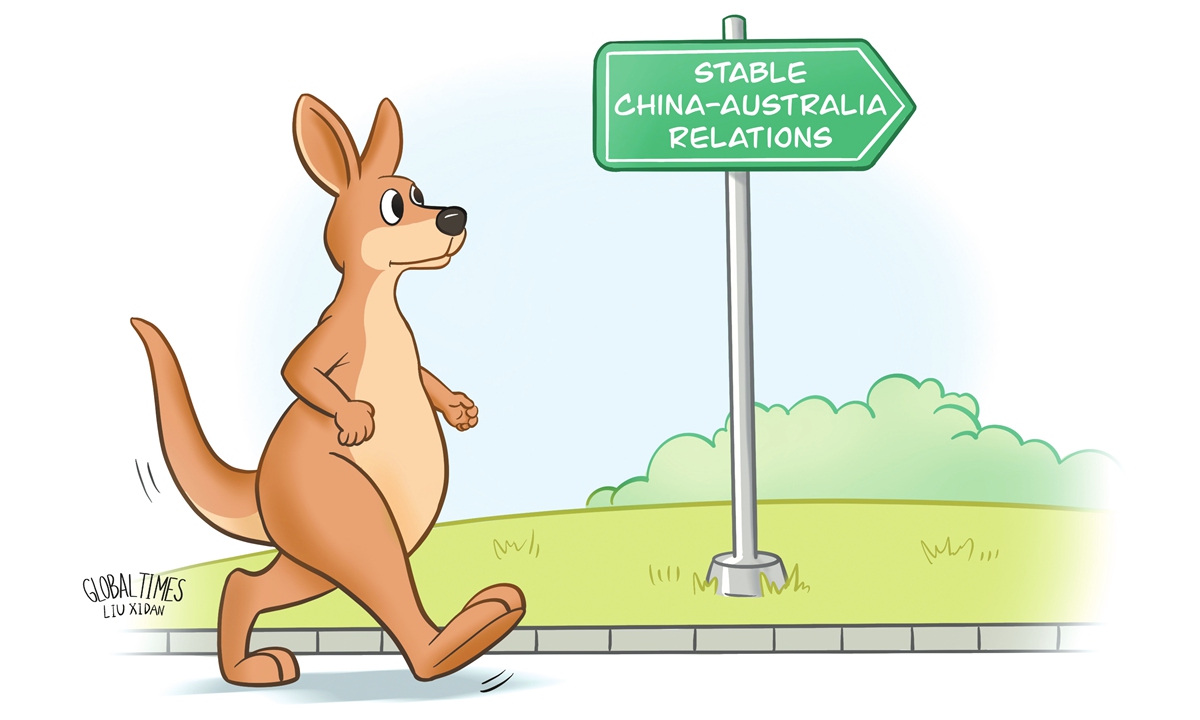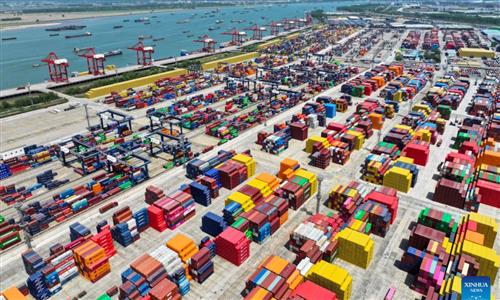
Illustration: Liu Xidan/GT
Australian Prime Minister Anthony Albanese and his ministers were sworn in for a second term on Tuesday after the Labor Party's landslide win in the national election. The new government's domestic and foreign policy directions have drawn widespread attention. Recently, Victorian Premier Jacinta Allan announced that she will lead a trade mission to China this September to hold in-depth talks on education, trade and culture. Allan emphasized, "In an era of tariffs and global economic uncertainty, I want to seize an opportunity for Victoria," adding, "We have an opportunity to turn a new page in our relationship with China."Allan's comments precisely reflect the public mood revealed by this Australian election. In fact, the vote took place against a backdrop of unprecedented global uncertainty and a "cost-of-living crisis" at home. At the crucial final stage of the campaign, the US announced it would impose "reciprocal tariffs" on most of its trading partners - even its ally Australia. That move left Australian voters feeling cold, anxious, and resentful, and caused trust in Coalition leader Peter Dutton to plummet. In the end, the Coalition suffered a crushing defeat, and Dutton himself became the first opposition leader in nearly a century to lose his own seat.
In an uncertain world, people crave stability, and Australian electoral behavior is no different: In challenging times, voters tend to stick with the incumbent government. Over the past three years, the Albanese administration has been defined by cautious steadiness. It's fair to say that stabilizing relations with China has emerged as one of Labor's standout foreign policy achievements.
Since Albanese's Labor Party came to power in May 2022, it has rolled back the previous Coalition's anti-China stance and taken proactive measures to enhance dialogue with Beijing. Under the direct engagement and strategic leadership of both countries' leaders, China-Australia relations have bottomed out and rebounded, warming across the board. Exchanges in various fields have taken positive strides, and economic and trade flows have fully recovered - earning widespread support on both sides. Throughout the election campaign, Labor, as the governing party, maintained continuity in its China policy and generally adopted a rational, restrained tone in all China-related statements. This pragmatic, steady approach won the trust of voters.
Mainstream polling ahead of the election showed that voters were almost equally confident in Labor and the Coalition on relations with the US. However, on relations with China - especially on China policy - confidence in Labor outstripped the Coalition by a full 20 percentage points. This gap underscores Australians' stronger appetite for a healthy, stable China-Australia relationship and their expectation that China-Australia free trade will help shield the economy from the shocks of economic nationalism.
Following his re-election, Albanese faces the crucial task of boosting economic growth and stabilizing foreign relations. In this context, the strategic significance of the China-Australia relationship is heightened. China is Australia's largest export market, and maintaining a stable relationship with China - solidifying and expanding exports to China - is vital for the well-being of the Australian people and for Australia's economic resilience.
On a strategic level, China and Australia need to work together to uphold the international system centered around the United Nations (UN), firmly defend the rules-based international order, and maintain the multilateral trading system. Australian society is increasingly recognizing that China is a reliable market and a trustworthy partner in a world full of uncertainty, and the China-Australia relationship provides significant certainty for Australia.
It is also worth noting that local diplomacy as well as economic ties are important aspects of the China-Australia comprehensive strategic partnership and are sources of vitality for economic and trade cooperation between the two countries. The Australian Labor government has extensive experience in promoting local cooperation between the two countries. Protecting the enthusiasm for local diplomacy, creating a favorable policy environment for local economic and trade cooperation, and providing strong support for local diplomatic practice are also essential.
In this election, the Australian people ultimately chose the Labor Party, the side of certainty facing an uncertain world, based on their expectations of policy stability and continuity. The Labor government now has more reason to adhere to an independent foreign policy and to work toward the steady and sustained growth of China-Australia relations. In this way, the two countries can provide a more stable and favorable policy environment for mutually beneficial economic and trade cooperation, striving to bring more tangible benefits to both countries and their people.
The author is an associate research fellow at the Institute of Asia-Pacific Studies at China Institute of International Studies. opinion@globaltimes.com.cn



